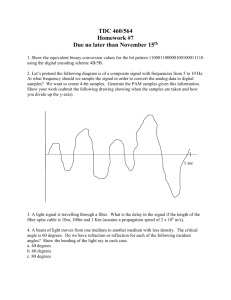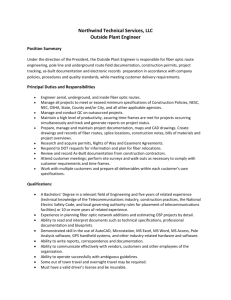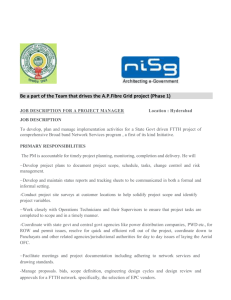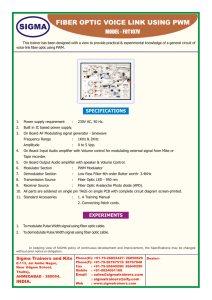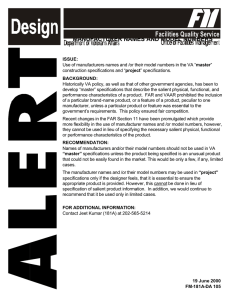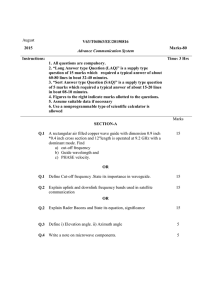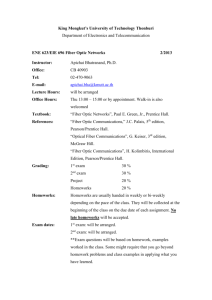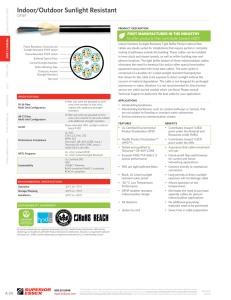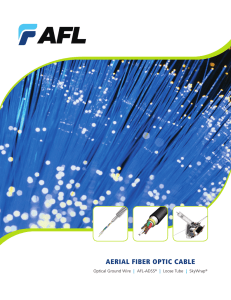University of Houston Master Construction Specifications Insert Project Name
advertisement
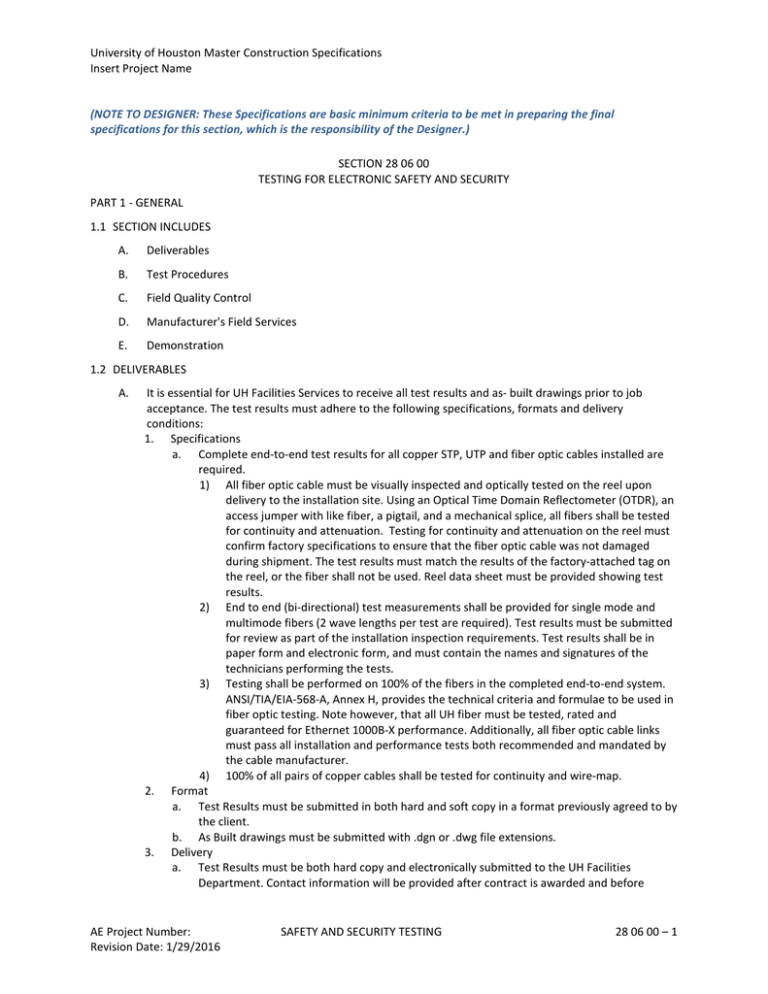
University of Houston Master Construction Specifications Insert Project Name (NOTE TO DESIGNER: These Specifications are basic minimum criteria to be met in preparing the final specifications for this section, which is the responsibility of the Designer.) SECTION 28 06 00 TESTING FOR ELECTRONIC SAFETY AND SECURITY PART 1 - GENERAL 1.1 SECTION INCLUDES A. Deliverables B. Test Procedures C. Field Quality Control D. Manufacturer's Field Services E. Demonstration 1.2 DELIVERABLES A. It is essential for UH Facilities Services to receive all test results and as- built drawings prior to job acceptance. The test results must adhere to the following specifications, formats and delivery conditions: 1. Specifications a. Complete end-to-end test results for all copper STP, UTP and fiber optic cables installed are required. 1) All fiber optic cable must be visually inspected and optically tested on the reel upon delivery to the installation site. Using an Optical Time Domain Reflectometer (OTDR), an access jumper with like fiber, a pigtail, and a mechanical splice, all fibers shall be tested for continuity and attenuation. Testing for continuity and attenuation on the reel must confirm factory specifications to ensure that the fiber optic cable was not damaged during shipment. The test results must match the results of the factory-attached tag on the reel, or the fiber shall not be used. Reel data sheet must be provided showing test results. 2) End to end (bi-directional) test measurements shall be provided for single mode and multimode fibers (2 wave lengths per test are required). Test results must be submitted for review as part of the installation inspection requirements. Test results shall be in paper form and electronic form, and must contain the names and signatures of the technicians performing the tests. 3) Testing shall be performed on 100% of the fibers in the completed end-to-end system. ANSI/TIA/EIA-568-A, Annex H, provides the technical criteria and formulae to be used in fiber optic testing. Note however, that all UH fiber must be tested, rated and guaranteed for Ethernet 1000B-X performance. Additionally, all fiber optic cable links must pass all installation and performance tests both recommended and mandated by the cable manufacturer. 4) 100% of all pairs of copper cables shall be tested for continuity and wire-map. 2. Format a. Test Results must be submitted in both hard and soft copy in a format previously agreed to by the client. b. As Built drawings must be submitted with .dgn or .dwg file extensions. 3. Delivery a. Test Results must be both hard copy and electronically submitted to the UH Facilities Department. Contact information will be provided after contract is awarded and before AE Project Number: Revision Date: 1/29/2016 SAFETY AND SECURITY TESTING 28 06 00 – 1 University of Houston Master Construction Specifications Insert Project Name project completion. PART 2 - PRODUCTS (NOT APPLICABLE) PART 3 - EXECUTION 3.1 TEST PROCEDURES 3.2 A. Install in accordance with manufacturer's instructions. B. Field Test Reports: Upon completion and testing of the installed system, test reports shall be submitted in booklet form and electronic media showing all field tests performed on, and adjustments made to each/any component and all field tests performed to prove compliance with the specified performance criteria. Indicate and interpret test results in written form and verbally to owner/consultant for compliance with performance requirements at a pre-scheduled meeting. 1. Specific test and verification requirements by demonstration or test are as follows. Owner, or Owner’s designated representative, reserves the right to witness any and all tests. a. Following factory assembly and delivery, the security subcontractor shall individually test each component and sensor and verify the proper functioning of each component within a particular sub-system. b. Following installation, individually test each component and sensor and verify the proper functioning of each component within a particular sub-system. Similarly test each sub-system until all detection zones, alarm assessment components, alarm reporting and display, and access control functions have been verified. Prior to final functional and operational tests of the system correct any deficiencies. After sub-system verification is complete, test the entire system to assure that all elements are compatible and function properly as a complete system. c. Upon completion of the above outlined tests conduct a formal test to be known as the “System Operational Test”, in which all components and sub-systems of the security system are demonstrated to operate together as a system. This test is to be performed over a continuous seventy-two (72) hour period. A formal test plan and test procedures for each portion of the test shall be prepared by the security subcontractor and submitted to the Owner/Architect for approval. The subcontractor must demonstrate that the security system components and sub-systems meet specification requirements in the “As-Installed” operating environment during the “System Operational Test”. While no formal environmental testing is required, temperature, humidity and other environmental parameters should be measured and recorded. Include this data in the test report document for the “System Operational Test. FIELD QUALITY CONTROL A. 3.3 MANUFACTURER'S FIELD SERVICES A. 3.4 Perform field inspection and testing in accordance with Division 1. Include services of technician to supervise installation, adjustments, final connections, system testing, and to train UH personnel. DEMONSTRATION A. Demonstrate normal and abnormal modes of operation, and required response to each. B. Provide 8 hours of instruction each for two persons. 1. Conduct instruction at project site with manufacturer's representative. 2. Include travel and living expenses for UH personnel. END OF SECTION AE Project Number: Revision Date: 1/29/2016 SAFETY AND SECURITY TESTING 28 06 00 – 2
